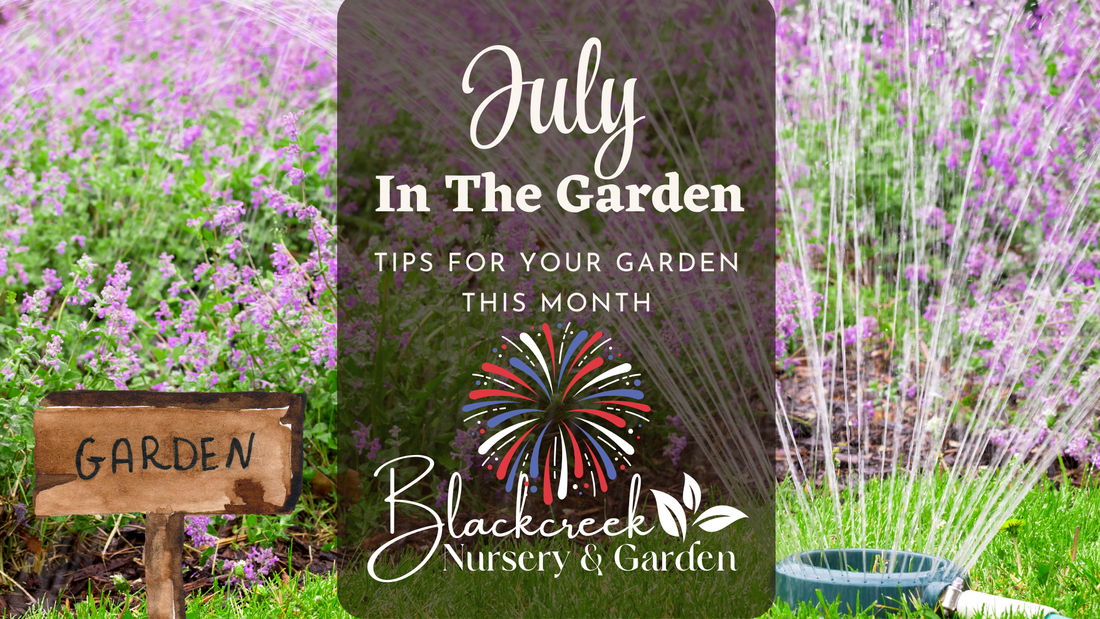
July In The Garden
Share
Gardening Tips for Maximizing Your Summer Garden
As the summer heat settles in, it's time to roll up your sleeves and tend to your garden. July is a crucial month for garden maintenance and ensuring your plants thrive in the heat.
Here are some essential tips and tasks to keep your garden flourishing throughout the summer season:
Watering Wisely With scorching temperatures, proper watering becomes paramount. Water deeply and infrequently to encourage deep root growth and prevent the soil from drying out too quickly. Consider watering early in the morning or late in the evening to minimize evaporation. Focus on the base of the plants and avoid wetting the foliage to reduce the risk of diseases.
Mulching for Moisture Retention Mulching is a lifesaver during hot summer months, helping to conserve moisture in the soil and prevent weeds from taking over. Apply a layer of organic mulch, such as straw or wood chips, around your plants to regulate soil temperature and reduce water evaporation.
Fertilizing for Growth July is a great time to give your plants an extra boost of nutrients. Apply a balanced, slow-release fertilizer or organic feed to promote healthy growth. Pay special attention to your vegetable garden, providing them with the necessary nutrients for abundant fruiting.
Pruning and Deadheading Regularly prune and deadhead your flowering plants to encourage new growth and extended blooming. Remove spent flowers, especially from annuals and perennials, to redirect energy towards healthy foliage and future blooms. Some plants fruit or flower on last year's growth, so pruning on some of these things should be done with caution. Hydrangeas (except for Panicles) blueberries and blackberries should be done right after blooming and fruiting and in enough time that new growth will emerge this season. Severe pruning with not enough time to put on new growth before fall will result in less flowers or fruit next year.
Pest and Disease Management Keep a eye on your plants for any signs of pests or diseases. July is a prime time for insect activity, so regularly inspect and apply appropriate organic pest control methods as needed. Be sure to check for common pests like aphids, spider mites, and caterpillars.
Harvesting and Enjoying the Fruits of Your Labor All of your hard work will begin to pay off in July as fruits and vegetables ripen. Harvest your crops at their peak of freshness the delicious rewards of your efforts. Regular harvesting also encourages the plants to produce more and helps prevent over-ripening and fruit drop.
Protecting The Pollinators Butterflies, Bees, and a whole host of beneficial insects are in full swing in July. Make sure to protect them by keeping harmful chemicals out of their way. Using organic, 'safe' control measures for weeds and other pests will help prevent injury to pollinators. Always read the label if you use a chemical to make sure their 'bee' safe. I've recently heard people using an old popular insecticide dust to kill unwanted insects. But did you know that dusting your veggies with an insecticide also kills the pollinators that are making it possible for your plants to develop fruit? A better choice is Diatomaceous Earth or Neem Oil Sprays - but again - read the labels. Our pollinators are in a feeding frenzy but don't forget to give them a drink of water. Providing a fountain, a small water garden, or even a bowl of water in your garden can give them much-needed hydration.
Planning for the Fall While enjoying the summer garden, it's also essential to start planning for the fall. Research and prepare for the cool-season crops that thrive in Georgia, such as kale, lettuce, and broccoli. Start seedlings indoors or in a partially shaded area to allow them to develop before transplanting them into the garden in late summer. Remember during the hottest parts of the day and stay hydrated while working in the garden. Gardening in July in Georgia may present its challenges, but with proper care and attention, your garden will continue to flourish and inspire. Happy gardening!
